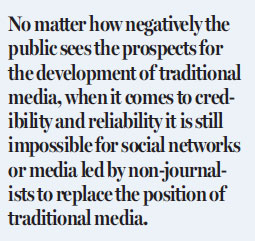Credibility factor keeps traditional media alive
Updated: 2017-02-17 09:30
(HK Edition)
|
|||||||
The rise of social networks and online media, together with the shutting down of several newspapers and magazines, have created a run of negative headlines about the prospects for traditional media over the past two years, with lines such as "Harsh winter for print media" and "Print media is dead" being the most common.
Before discussing whether print media has really entered the intensive care unit or is already at the edge of death, I think there is a need to clarify if the "print media" everyone talks about refers to the traditional media, or is limited to print media such as newspapers and magazines. I need this clarity because a survey shows that the number of people who bought newspapers over the past three or four years has gradually declined, but the number receiving news from electronic newspapers has increased significantly.
It can be said that there has been a change in Hong Kong people's news-reading habits in recent years. They might not have to hold the newspaper to receive information as they did in the past; instead they browse news on the internet. However, the websites people visit are mainly electronic versions of those paid newspapers. This shows that we still tend to trust traditional media more in terms of the credibility of news and information on current affairs.

In August, the Centre for Communication and Public Opinion Survey of the Chinese University of Hong Kong conducted a survey, asking a random sample of 907 citizens aged 18 or above to rate the credibility of media as a whole and 29 media organizations.
Electronic media and paid newspapers received higher ratings than free newspapers and online media in general; online media's ratings on credibility were low while their average score was the lowest among different media channels.
Clement Y.K. So, professor of the School of Journalism and Communication of the Chinese University of Hong Kong and associate dean of the Faculty of Social Science, compared the public's ratings on the credibility of media with the traffic statistics of online media from Alexa.
So found there was a positive correlation between the credibility of paid newspapers and electronic media and the traffic rankings of their websites. This suggests that the higher the credibility, the higher the traffic.
Yet the comparison between free newspapers and online media is not the same - here credibility and traffic had no correlation. Readers only consume simple news instantly from free newspapers and they tend not to have high expectations on the creditability of free and instant information provided by online media.
I remember one incident which was reported rapidly over social networks. When someone questioned the authenticity of this incident, a responder commented: "This has been reported by the newspaper. It should be true."
Recalling this comment, I am not sure if I should cry or laugh. Many of the younger generation who seem to be active on social networks often scoff at traditional media or the mainstream media. But they still placed more trust in them. As So said, perhaps the public might not have very high expectations on the credibility of free and instant information provided by online media.
In addition, looking back to the disturbing US presidential election at the end of last year, some believe that one reason behind the defeat of Democratic Party candidate Hillary Clinton was fake news online. A number of reports or news about Clinton or the Democratic Party shared all over social networks were in fact unconfirmed or even false news which was purely fictional.
In the wake of this, the Czech Republic - which is going to have two key elections in the next two years - has set up a special department to crack down on fake news. It seems the public has been aware of the scourge of the overflow of false news and reexamined the credibility of the media and the social role of traditional media.
It cannot be denied that in recent years traditional media have faced setbacks, from changes in reading habits and the economic slowdown, to numerous challenges in operations, and tighter manpower limiting their capacity to publish the best content.
However, the way traditional media handle news and information still strictly follows an inherent code and standards, which include never spreading rumors or reports without any fact checking. Therefore, no matter how negatively the public sees the prospects for the development of traditional media, when it comes to credibility and reliability it is still impossible for social networks or media led by non-journalists to replace the position of traditional media.
There is still room for improvement for traditional media or print media in the foreseeable future, but print media will not come to a sudden end.
The author is the chairman of the Newspaper Society of Hong Kong.
(HK Edition 02/17/2017 page1)